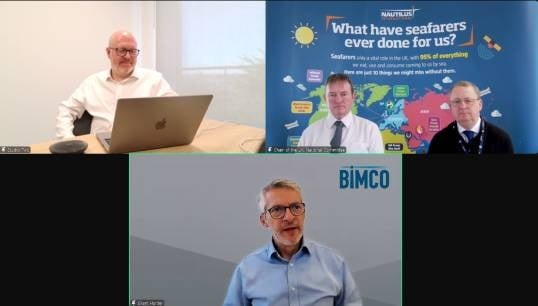- Topics
- Campaigning
- Careers
- Colleges
- Community
- Education and training
- Environment
- Equality
- Federation
- General secretary message
- Government
- Health and safety
- History
- Industrial
- International
- Law
- Members at work
- Nautilus news
- Nautilus partnerships
- Netherlands
- Open days
- Opinion
- Organising
- Podcasts from Nautilus
- Sponsored content
- Switzerland
- Technology
- Ukraine
- United Kingdom
- Welfare

The biennial Nautilus UK Branch Conference is an opportunity for professional development as well as Union business, and this year was no exception.
The theme of the conference was artificial intelligence (AI) in maritime, so two expert speakers were invited to explore the current status of AI technology and how it might be used in the shipping industry.
'Data management is now beyond the reach of humans'
Speaker Grant Hunter is director for standards, innovation and research at the international shipowners' association BIMCO, and his job involves looking at the future of shipping.
In his presentation, Mr Hunter emphasised from the start that AI should be seen as a tool for maritime professionals to use rather than a replacement for seafarers' jobs.
He pointed out that the vast amount of data in the world today was beyond the reach of humans to process and analyse, and said AI would be essential to a maritime future involving feedback from thousands of sensors on remote-controlled vessels.
However, AI is only as good as the data it is 'trained' on, and generative AI applications such as ChatGPT have been known to invent facts, so users in the shipping industry must remain vigilant.
'Think of AI as being like having a student to help you, but you still have to check their work,' he concluded.
'Embracing AI should be part of continuous improvement mindset'
Speaker Matt Frank is chief AI and innovation officer at Ancoris, where he builds, manages and runs AI cloud platforms for organisations.
Mr Frank began his speech by congratulating Nautilus on its innovative use of AI-generated voices at the conference to give presentations on the UK Branch Conference Report – saying this was something he had never come across before.
He felt this was a positive example of an organisation seeking to be ready for the 'next surprise' in tech development, and stressed that all companies needed to have a 'continuous improvement mindset', as this is how success has been achieved during a series of technological revolutions in the past 250 years.
Mr Frank noted that AI was particularly useful for synthesising and summarising information, and he showed how this had been done with the UK government's Maritime 2050 report. He also gave numerous examples of how AI had been deployed to good effect at non-maritime businesses he had worked with.
Member questions about AI
Following the speeches, Nautilus members asked whether the speakers thought that AI was a danger to security in maritime or increased the risk of fraud. Grant Hunter said he felt that the security situation with digital tech was no worse than the 'paper world', giving the example that a fake bill of lading could easily be produced with a photocopier.
There was also a question about whether AI was truly not a threat to maritime jobs, and the speakers conceded that, while the quantity of jobs would be unlikely to change, the nature of the roles would, so seafarers and employers would need to acquire new skills.
Mr Hunter noted that some new jobs enabled by AI could actually address workforce shortages, as seen in Europe's inland waterways, where operating remote-controlled vessels from shore could be seen as more appealing than working on a barge.
Tags
More articles
Glimpsing our maritime future: the 2024 Nautilus UK Branch Conference
Nautilus members vote to support RFA personnel and monitor AI in maritime at UK Branch Conference
Nautilus International members at the Union’s UK Branch Conference have voted unanimously to reaffirm support for striking seafarers at the Royal Fleet Auxiliary (RFA) and to campaign for the responsible use of artificial intelligence
